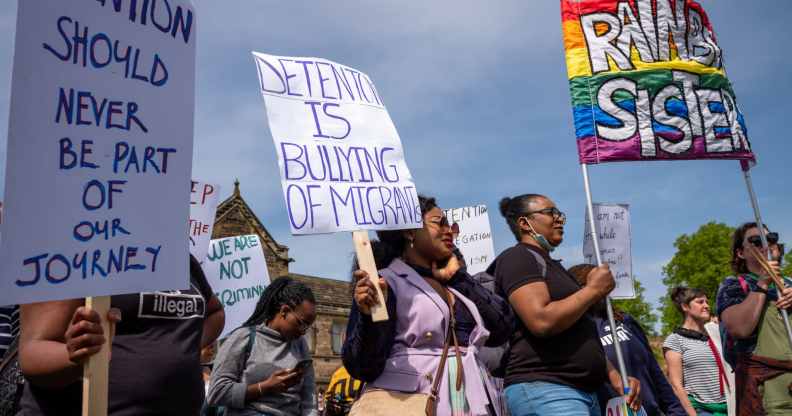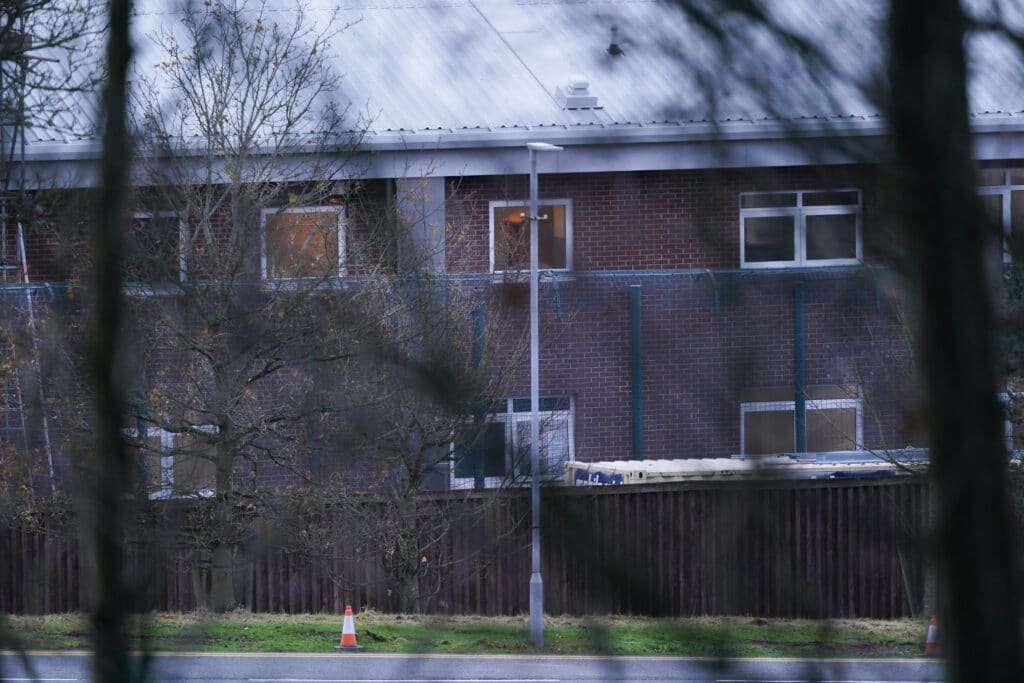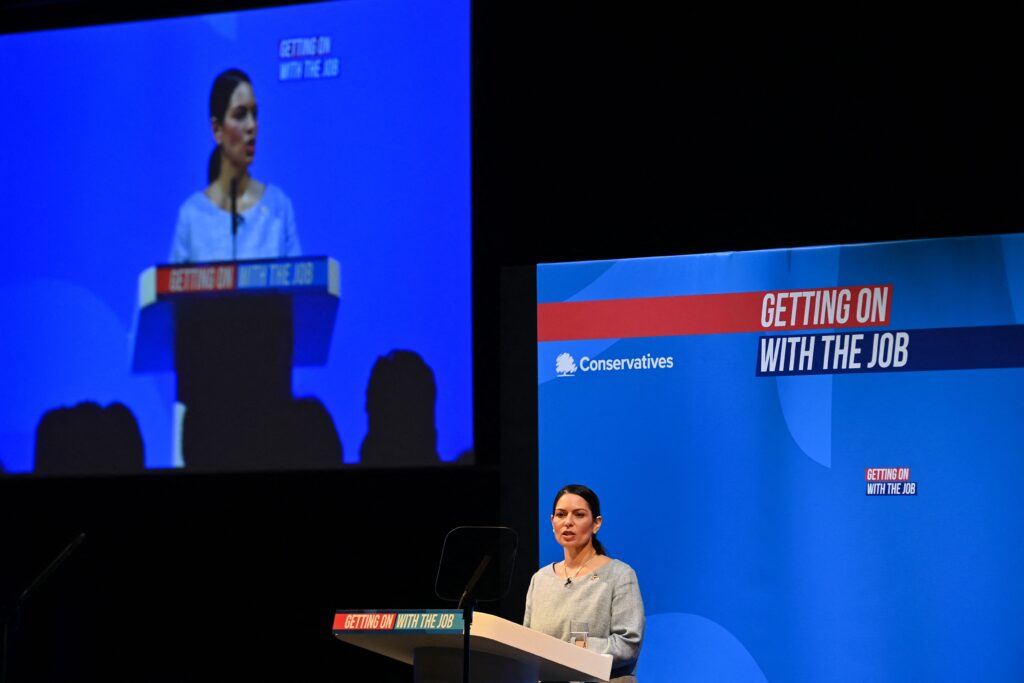Gay man deported from UK to Nigeria despite fears he’ll face ‘near-certain death’

Home Office officials acknowledge the threats LGBTQ+ Nigerians face – but they deported a gay Nigerian asylum seeker anyway. (Ian Forsyth/Getty Images)
A gay man has been deported from the UK to Nigeria, despite his having received numerous death threats.
Adeniyi Raji, 48, was among at least 10 refugees on a Home Office charter flight to Lagos, Nigeria that took off from Birmingham Airport on Wednesday night (29 June).
He arrived in Britain in 2017 from Nigeria to escape death threats that were being sent to him on social media.
Being gay is illegal in Nigeria and punishable by up to 14 years in jail.
The government’s own foreign travel advice for the country states that “homosexuality is generally viewed as unacceptable in Nigeria”, and that “lengthy prison sentences” await those in same-sex relationships or who even support “gay clubs, societies and organisations”.
Nevertheless, the authorities moved to deport Raji. After applying for asylum, he was immediately detained. A first-tier immigration tribunal rejected his asylum application, and his case failed at appeal – the courts claimed it was safe for him to return.
Before the flight took off, human rights activist Bella Sankey said Raji would face “near-certain death” if he was sent back to Nigeria.
“He has been subjected to a vicious homophobic attack in Nigeria, his ex-partner has been killed and he has been told he will be killed if he is returned to Nigeria,” she tweeted.
Raji told the Guardian in 2018 that he came to the UK “to seek refuge and humanitarian protection” because his “life was in danger in Nigeria”.
“I was attacked on several occasions,” he said. “[My] ex-wife caught me and my former partner in bed. As soon as she saw us, she immediately raised the alarm. People gathered and started beating us severely. After that, she divorced me.”
Raji was fired from his job and his name and picture were splashed across newspapers by the police. “They kept saying that anyone who has useful information that could lead to my arrest should come forward [so that I can] face the wrath of the land as a result of my sexual orientations,” he said.
“So after all that we did to you before, you are still a practising homosexual,” read one threat sent to him. “Wait until we see you down here, that will be the end of you.”
Despite this, Raji was placed on the deportation flight.

The Derwentside Immigration and Removal Centre. (Ian Forsyth/Getty Images)
“Raji came to the UK seeking protection because he had been publicly outed and his life was in danger in Nigeria. But instead of finding that safety here, Priti Patel and Boris Johnson’s government has decided to send him back to near-certain death during Pride month,” says Rainbow Migration, a charity that supports queer migrants, told PinkNews.
Rainbow Migration says Home Office officials did not believe Raji was gay. “[They] decided to send him back to a place where he is known to be a gay man and therefore in danger of death,” it added.
“It’s the first time in many years that we see an LGBTQI+ person we support being sent back to a dangerous situation, and are devastated that this couldn’t be stopped.”
Many of the asylum seekers set to be deported, including mothers and grandmothers who had been living in Britain for decades, had been detained at the Derwentside Immigration Centre, formerly known as Hassockfield, in County Durham.
Dozens of protesters gathered outside in an attempt to stop the flight, the BBC reported.
They included members of the No To Hassockfield Campaign, a network of anti-detention campaigners advocating for the closure of the centre, the Durham People’s Assembly, Abolish Detention and Women for Refugee Women (WfRW).
WfRW has challenged the government in the Royal Courts of Justice over the poor conditions of the inmates in Derwentside, which include a reported lack of legal advice, next to no mobile phone reception and how isolated the centre is from basic support services. A hearing will take place in June.
But on the eighth hour of the protest, demonstrators watched in horror and rage as the inmates were taken out of the centre on HallMark Coaches.
Five protesters were arrested on suspicion of obstructing a highway and remain in custody.
Raji’s case is the latest in a long legacy of the Home Office failing LGBTQ+ asylum seekers and refugees.
Reports have revealed interpreters subjecting vulnerable queer people to bias and derogatory remarks, immigration officials using an applicant’s religion or even their own anti-LGBTQ+ relatives to discredit them, and those assessing claims relying on demeaning stereotypes to decide if someone is who they say they are.
Home secretary Priti Patel’s Nationality and Borders Bill will make the system even more hostile. Instead of having to prove to a “reasonable degree of likelihood” that you’ll face persecution, applicants will now have to reach the far higher level of “balance of probabilities”.

Home secretary Priti Patel has sought to toughen Britain’s already hardline immigration rules with the Nationality and Borders Bill. (PAUL ELLIS/AFP via Getty Images)
Meanwhile, an immigration pact to “off-shore” some asylum seekers to Rwanda amounts to what one expert said is a “death sentence” for LGBTQ+ people.
A Home Office spokesperson said: “The UK only ever returns individuals to their country of origin when the Home Office and, where applicable, the courts deem it is safe to do so.
“All asylum and human rights claims are carefully considered in accordance with our international obligations. Each individual assessment is made against the background of relevant caselaw and the latest country information.
“The New Plan for Immigration will fix the broken immigration system and expedite the removal of those with no right to be here.”
But to Steve Crawshaw, the director of policy and advice at Freedom from Torture, this simply isn’t good enough.
Freedom from Torture provides specialist mental health support for asylum seekers and refugees who have fled from torture. Knowing that Raji is being sent back to the very persecution he attempted to flee has left Crawshaw outraged.
“The hypocrisy is staggering,” he says. “The UK government boasts about its support for the LGBQTI community, bedecking their social media accounts in rainbow flags for Pride month and publicly railing against repressive states which persecute sexual minorities.
“But yesterday, they deported a gay refugee to a country where he could face imprisonment and even death.”
The Home Office is among the government departments that have splashed its logo with the colours of the rainbow on social media.
“This decision lays bare the toxic effect of the Home Office’s hostile environment policies,” adds Crawshaw, “which dehumanise immigrants and people seeking safety in this country.”

